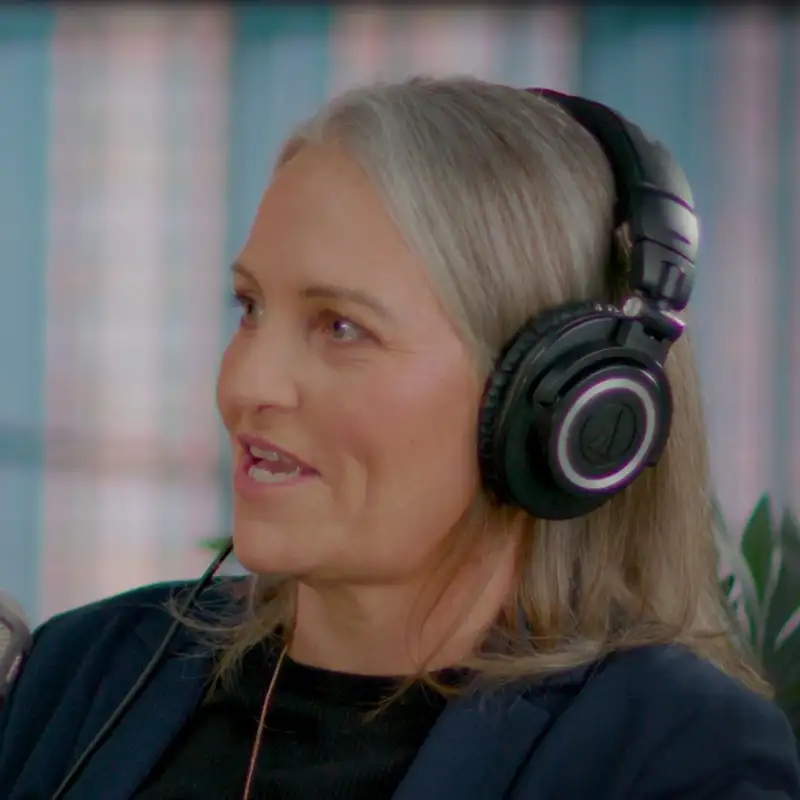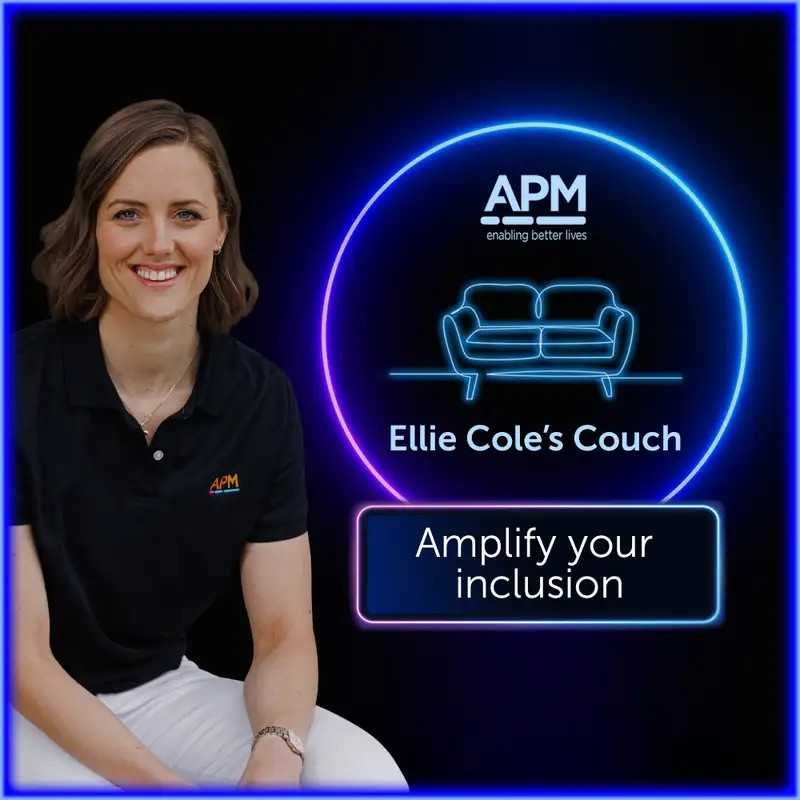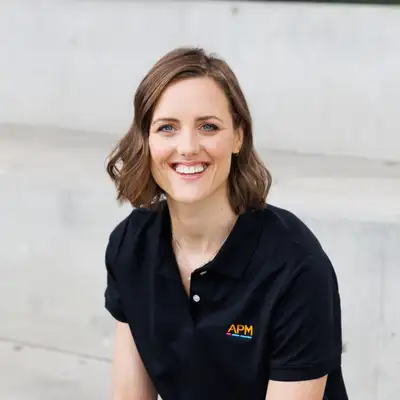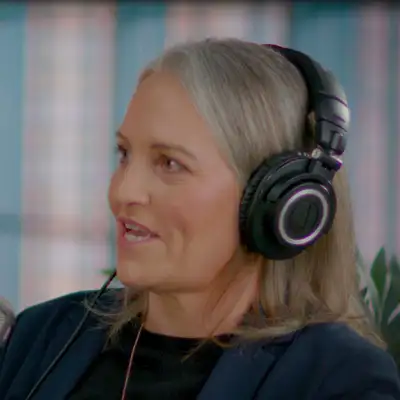How inclusive hiring helps businesses thrive with Red
Red: Hello. I'm Red. And I have worked
for Compass Group Australia
for going on to four months now.
I am the Unit Manager for
Air New Zealand Lounge
at the Perth International Airport.
And it's a really, it's a fantastic place to work
and it's a fantastic company to work for.
Ellie: Tell me about the relationship
between The Compass Group and APM.
Do you know when that journey
and that partnership began?
Red: I know when it started for me, obviously.
I have a fantastic key accounts manager,
and Elizabeth is her name, and she spoke
incredibly highly of Austin.
Ellie: Austin at APM, the famous Austin.
Red: He definitely is famous.
And Elizabeth is quite a
dynamic and energetic individual,
and really positive.
And so when she recommended meeting
Austin, I was like, okay,
I want a piece of that action.
Ellie: So back when Elizabeth spoke to you
about Austin at APM,
what was the, I suppose, the trigger
for that conversation to happen?
Were you looking for people
with disabilities to join your team?
Were you looking for, I suppose,
to capitalise on the value of diversity
and inclusion that you already have
within your organisation?
What was the trigger that made
you speak to Elizabeth about APM?
Red: Both of those items are,
they're definitely high on my agenda.
We also, it's actually quite challenging,
hiring and recruiting at the airport.
It's a really long process,
and you really need to find
the right people for the right job.
And the wider the scope,
the better the outcome.
It's fantastic to be able to have options and,
really embrace diversity,
because I think that
if you can do that,
sometimes it can be challenging,
but I think that you get a better outcome.
It's a more rewarding outcome.
So we were really looking to increase
the pool of recruitment,
for recruitment, and
APM was another avenue
that Elizabeth just couldn't
stop raving about.
And then when I met, or I spoke, with Austin,
I thought, yep, she's right.
This could be a whole new partnership
that I hadn't experienced before.
We just talked about what APM
can do, how it can reach out,
how it can support
the people industry that I'm in
and how we could help each other.
And for myself, being new to Compass,
there's so much to learn
as well as taking on board a new team.
You're working for the airport,
you're working for Compass
and you also have a client.
So to have someone that
is able to support you in a different way,
but add something
to your current workplace is,
I just could see the benefits
straight away.
And instantly, within a couple of hours
after getting off the telephone,
he started sending me through a couple
of really fantastic candidates,
and it was just at the right time as well,
because we were doing
a recruitment drive and he managed
to help me land,
instantly I landed three individuals that helped me
within the lounge
and also with our new hosting contract.
Ellie: You mentioned before that you had to navigate
when you were a little bit
younger, territory around
disability or language, and a lot of people
feel really uncomfortable around
language with disability,
or saying or doing the wrong thing.
So afraid to offend.
But, you know, you've been very fortunate
to have the support of APM to help
you navigate yourself
through that journey.
Has there ever been a moment
throughout this process
where you have been afraid to say
or do the wrong thing,
when employing someone with a disability?
And what advice would you give
to other organisations who are thinking
about stepping into the space
of employing someone with a disability?
Red: I think you need to be clear from the outset,
what the expectations are
within the workplace, and keep it honest,
transparent, and clear.
So that if there's ever a point
that you're not sure about,
the door is always open.
We need to have a conversation,
clear the air, and make sure
that we get back on track really quickly.
I think that when you feel doubts,
that's when things can go
a little bit haywire.
I think that if you keep things simple
and you're just honest,
I think that people appreciate that
both ways. Respect goes both ways.
So if you respect your employees
and they respect you for the way
that you manage yourself and you
conduct yourself, it goes both ways.
So when you do have those issues,
you're honest,
you're straight to the point,
but you're also caring in the way
you deliver it, and you're respectful
in the way you handle that.
I think you also need to
be tolerant as well.
You need to sometimes stop and remember
that not everyone is the same.
And most people that you employ, if you employ
them the right way and you do your due
diligence, and you ask the right
questions at the beginning,
you're going to hire people
that have good hearts.
And I always think the people
that have good hearts,
the right people for your team.
Ellie: You've just mentioned that a huge
challenge of changing a team's
culture is for the team to be really
open-minded with accepting new people
into that team who may have diverse
backgrounds or different perspectives.
You know communication
is really important,
and transparency is really important.
But what tips would you give
to other organisations who are looking at
changing the dynamic within their team?
Maybe bringing in people
that have disabilities?
What tips do you have to help
that transition process,
not just for the person
with the disability,
but for the rest of your team as well?
Red: Well, that's a great question
and it's a really hard one.
I think that you need
to have a couple of supports.
You need to make sure that obviously
the individuals that are coming in
are going to be very supported,
that they're going to feel comfortable
that they understand,
some of the black and white
so that they can feel confident,
and if there's moments or windows
that are downtime, what can they do
to be proactive and help the team.
And I think you also need to
make sure that you
communicate
to particularly the senior team,
what you're doing,
what the vision is, what the goal is,
what the company's goals are,
and how we're going to do it
so that it is clear for the person
coming in,
but it's also really clear to the individuals
that are currently working in there,
so that they know how they can help the individual,
but they can also get help themselves
if they have never experienced
that before.
What I've found doesn't
work is when you get,
and I've had in the past where
agencies will provide you with,
you know, a wider pool of people,
and then these people come in
and they're great individuals,
but the environment
in which they're coming into
is not supported enough.
And so the the management
structure is not ready.
And not, they haven't been provided
the tools that help them
manage and introduce a new dynamic
to a very, a team, a small team.
And sometimes that can cause conflict
or misunderstandings.
I think the more openness you can have
with the team, positivity
that you can have with the team, and fun,
it makes the workplace
easier, more enjoyable to come and do
your day-to-day job,
you know, I want to be able to come to work
just like any of my team members
and know that,
you know, I can make someone happy.
I can make them feel
like they're part of my team and that
we're all going in the same direction.
I think clarity is really important
on what's expected from everyone.
Ellie: And it sounds like, you know,
the discussion that you had prior to
people from APM coming into
your organisation,
it sounds like it
gave you a lot of confidence.
It would have also given them
a lot of confidence as well.
Was there any modifications
or accommodations that you had to make
within your organisation, if any?
Red: I think just having the background
knowledge on what someone needs,
particularly if it's not something
that people can see all the time,
because disability has
a variety of appearances.
And just making sure that the conversations
that you would have with
our other supervisors that were on
so that they felt comfortable
in how to deliver tasks,
and how to give demonstrations as well,
because we had one individual, that’s so good on I.T.,
would just go hurtling through
all the online training
but still require a little bit
more practical training.
So having that background knowledge,
I guess you can help them
on their initial journey,
which helps them settle in quicker.
And again, you don't always get that.
So this was a really refreshing,
nice little start to my Compass journey as well.
Ellie: Do you have any success stories
with your team that you'd like to share?
Red: Yeah, I've got something that I will
never forget one of my early stages,
of a young chap.
And he couldn't sweep the floor
properly and it was part of,
it’s just something that as part
of his disability that he struggled with.
But no one told me this. No one knew.
Anyway, so we took him
aside and we went through the
how-to and what the correct procedure was
and how many times you had to,
you know, how you had to hold the broom, etc., etc.
He had a lovely moment
where he cleared the floor,
and he did such a great job, like,
he really did and he came back
and he said, “God, I want you to come
and check the floor, I’ve done a really good job I think”.
I was like, “oh my God,
Michael, it's just a fantastic job.”
And he got such pleasure from
doing it correctly.
And he said afterwards, “you know,
thank you for showing me how to do that.”
And I just thought, it was just really nice
because that's such a small thing.
Ellie: (A small thing to us) Red: Yeah, exactly.
Red: And it made a huge difference, and his
father came in afterwards as well.
Just like “that was really wonderful, came home, talking about brushing. He's now going to clean the house.” I said “great!”
Ellie: He’s probably cleaning the floor every day now.
But you know, those moments,
maybe seem small to us but
really big to other people.
And I can almost guarantee that every time
Michael sweeps the floor now,
he probably thinks about you.
For other organisations
that would like to employ people
with disabilities, I'm sure you have
some advice for them.
Red: I think - absolutely - open your doors.
I don't think there's
anything to lose at all.
I think there's everything to gain.
The broader the spectrum of people
that you get to work
with, you learn so much more.
It's just invigorating and it's enriching.
I can't advocate it enough.
I think that it provides the
next level of service.
I think when you have diversity, difference,
people that offer
a different focus,
have a different view on life,
you offer something wider to the
the guests coming in,
you can engage in broader topics.
You also have - in the background as well -
it enables the team to grow as well.
It can be challenging and a little bit uncomfortable
sometimes because it's change,
but I think that it's more rewarding
because you learn something different.
It's so lovely to... I'll be walking
past the buffet section,
and I can hear in the kitchen, you know,
they've had a bit of a chuckle
and they're all having a laugh and they,
you know, I've got so many
different nationalities
now working on our team,
all walks of life, disabilities,
men, women, transgender.
We've got the works,
so it just makes life interesting.
Creators and Guests



